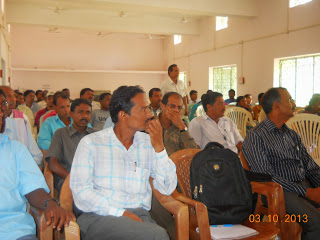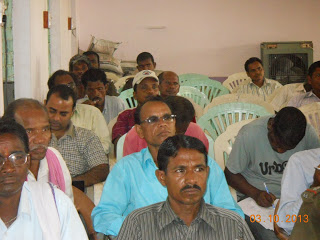A workshop was held on the “Scheduled Tribes and Other Traditional Forest Dwellers (Recognition of Forest Rights) Act, 2006 and Amendment Rules 2012” for Panchayatraj Representatives at Laxmanpur Block Office, Laxmanpur, District Sambalpur, Odisha, India on October 3rd 2013. The workshop was organized by Loksaktimukti Sanghathan, a non-registered organisaton, in collaboration with Vasundhara, Bhubaneswar and Natural Justice. The Laxmanpur Block Development Officer was present at the workshop on behalf of the government. Mr Ananto Panda from Loksaktimukti Sangathan briefly explained the background and purpose of Forest rights act and rules in the workshop. Ms Pspanjali Satapathy from Vasundhara organization elaborated on the entire act, its rules and usage. She opined in the workshop that for the first time in India, the forest rights act recognizes people who live in and depend on the forest. The maximum number of Adivasis live in the forest area and they depend on it for their regular livelihood. Adivasis naturally live with the forest and save the forest. They also use forest products for their common diseases. The Adivasis and Non Adivasis who depend on and live in the forest can apply under this act for recognition of their rights over their homestead, cultivable land, non cultivable land and use of forest products.
The act recognizes two kinds of rights. One is family rights and the other is community rights over forests. The recognition process begins at the village level through the forest right committee. The forest rights committee members are from among their village where they decide who actually lives and depends on the forest. Before this act the government called them encroachers in the forest area. This act provides maximum powers to Gram Sabha and also it defines the terms “Gram Sabha” and “Palli Sabha”.
The Sambalpur District Welfare Officer Ms. Mamata Parida informed the workshop that recently the District Collector directed all the Tahasildars to implement the Forest rights act and it’s amendment rules on the lines of community rights over forest land. The government is in the process of providing community rights over forest land. Ms Puspanjali Satapathy said that the Kendu Patra and Bambo are coming under Grama Sabha rights and no need to fear the sale of these two things. The act and rules also cover displacement. The Forest Rights Committee should constitute according to carom. For example, a forest rights constituted with 10 persons among them 7 persons must be Adivasis and 3 persons must be females belong to adivasis. Kishore Kumar Patnaik (Fellow, Natural Justice) emphasized how to get the record of rights on forest land under the forest right act and rules and it’s legal values on environmental issues. The Panchayat representatives and people from different villages participated in the workshop. Around 90 persons from different Panchayats participated in the workshop. The participants interacted and clarified their doubts with the government officials and organizers. They anguished in words why there is a lot of delay to recognize the land rights and also why people are not able to get a piece of land to stay whereas the industries are able to get hundreds of acres immediately without any hassles and hindrances. The workshop concluded with the vote of thanks by a member of Loksakti Mukti Sangathan.


